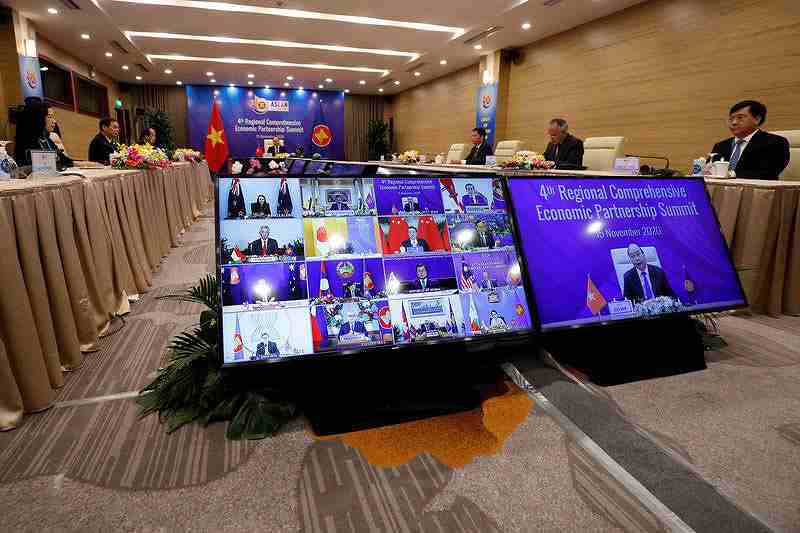
Vietnam’s Prime Minister Nguyen Xuan Phuc chairs the Fourth Regional Comprehensive Economic Partnership Summit as part of the 37th ASEAN Summit in Hanoi on Nov. 15, 2020.
November 4, 2021
With the Regional Comprehensive Economic Partnership set to take effect on Jan. 1, hopes are growing in participating countries that it will help save a regional economy that has slumped amid the spread of the novel coronavirus.
At the same time, most of the member countries have a growing sense of caution toward China, which appears to want to shape the field of trade in the Asia-Pacific region.
The RCEP is a free trade agreement among the Asia-Pacific nations of Japan, Australia, Brunei, Cambodia, China, Indonesia, Laos, Malaysia, Myanmar, New Zealand, the Philippines, Singapore, South Korea, Thailand and Vietnam.
The RCEP member countries account for about 30% of the world’s population and also 30% of its gross domestic product. The trade deal is designed to eliminate tariffs on 91% of goods among the member countries.
In particular, about 90% of auto parts shipped to China will be exempt from import tariffs, which is expected to greatly benefit Japanese automakers. Japan estimates that being a member of RCEP will have a positive economic impact, boosting real GDP by about 2.7%.
With the elimination of tariffs, companies are likely to have more options for procuring raw materials and choosing sites for factories.
For example, the trade deal is expected to make it easier for the apparel industry to divide its operations, such as by using fabrics made in China to sew garments in Vietnam or Cambodia and then sell them in Japan or Australia.
Companies have been reviewing their supply chains because of delays in the flow of shipping containers and a shortage of semiconductors.
RCEP countries are likely to take advantage of the trade deal to accelerate their efforts to entice foreign companies to set up plants.
Taking control
With China’s growing economic and military presence in the Asia-Pacific region in recent years, India — which is concerned about an influx of Chinese goods — withdrew from RCEP negotiations in 2019.
Japan, Australia and other countries are expected to face challenges as they navigate the waters of the pact.
The RCEP has strategic significance for China in breaking the ring of containment by the United States and European nations, and enabling it to take the lead in regional trade.
For this reason, China quickly ratified the agreement in April, and even encouraged the participating countries to put the agreement into effect as soon as possible by mentioning the effective date of Jan. 1, 2022.
China has also been making preparations for the next step after the RCEP.
In September, China applied to join the Trans-Pacific Partnership, an agreement among 11 countries including Japan and Australia.
On Nov. 1, the country applied to join the Digital Economy Partnership Agreement, an agreement among Chile, New Zealand and Singapore.
These moves by China apparently come from its intention to expand its influence in the United States’ absence from such agreements, observers said.
“The RCEP’s provisions on e-commerce allow for exceptions in terms of security. Japan will need to keep a close watch to ensure that other participating countries do not arbitrarily apply these provisions. If there are problems, Japan will need to bring them up and urge improvements,” said Junichi Sugawara, senior researcher at Mizuho Research & Technologies Ltd.
Top Articles in Business
-

Prudential Life Insurance Plans to Fully Compensate for Damages Caused by Fraudulent Actions Without Waiting for Third-Party Committee Review
-

Narita Airport, Startup in Japan Demonstrate Machine to Compress Clothes for Tourists to Prevent People from Abandoning Suitcases
-

Japan, U.S. Name 3 Inaugural Investment Projects; Reached Agreement After Considerable Difficulty
-

Toyota Motor Group Firm to Sell Clean Energy Greenhouses for Strawberries
-

SoftBank Launches AI Service for Call Centers That Converts Harsh Customer Voices into Softer Voices
JN ACCESS RANKING
-

Japan PM Takaichi’s Cabinet Resigns en Masse
-

Japan Institute to Use Domestic Commercial Optical Lattice Clock to Set Japan Standard Time
-

Israeli Ambassador to Japan Speaks about Japan’s Role in the Reconstruction of Gaza
-

Man Infected with Measles Reportedly Dined at Restaurant in Tokyo Station
-

Videos Plagiarized, Reposted with False Subtitles Claiming ‘Ryukyu Belongs to China’; Anti-China False Information Also Posted in Japan






















